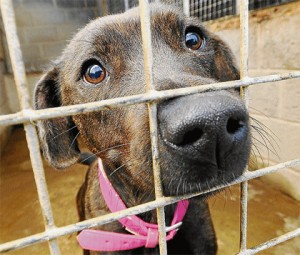This is a guest post from Lindsay Stordahl. Lindsay Stordahl maintains the blog and dog training forum at ThatMutt.com where she writes about dog behavior, dog rescue and more. She also owns the pet sitting business, Run That Mutt. Check out her new ebook on how to start a pet sitting business.
How to determine if a rescue group is reputable
Many people consider adoption first when they want to obtain a new dog, so they start searching online for various rescue groups and shelters. Most of these groups are real, reputable options for adopting a new pet. However, the internet does make it easy for anyone to put up a web site and pose as a “rescue organization.”
An example of a dog rescue scam is when someone posts a “free to good home” ad and then asks the buyer to pay for shipping, according to the ASPCA. Another example is when a breeder poses as a rescue group and charges $1,000 in “adoption fees.”
So, how do you know the rescue group is what it says? How do you know it’s not a puppy mill posing as a rescue group? How do you know that “free” bulldog puppy “in distress” is real?
First, it helps to understand what a rescue group actually is.
What is a rescue group?
Rescue organizations typically rescue dogs directly from pounds and shelters or from individuals who are trying to re-home them.
Rescue groups may or may not have an actual shelter, so they often house the dogs with foster families or in private dog boarding facilities. Because the dogs are not in danger of being killed (as they might be at a shelter or pound), there is less urgency for rescues to get the dogs adopted. Therefore, fees are generally higher, and the adoption process is often more complicated.
There are also individuals who will rescue homeless dogs and try to find them homes through Craigslist and other sources.
Adopting a dog through a reputable rescue group or individual is perfectly fine as long as you take some precautions.
How to protect yourself from a ‘rescue’ scam:
Verify that the rescue is incorporated as a charitable organization.
Checking on the rescue group’s registration status is an extra precaution you can take if you notice any red flags or if something just seems off. Reputable rescue organizations should want to be registered and licensed on the state level for both tax reasons and credibility. You can do a search on your state’s government web site to find out if a rescue organization is in fact licensed.
In addition to obtaining a state license, animal rescue organizations that take in more than $5,000 annually are required to file 501(c)(3) tax-exempt status with the IRS, according to Petfinder.
There is really no reason why a rescue would not seek tax exempt status unless it is a small group just getting started. As a potential adopter, you should ask the group about its tax exempt status.
Familiarize yourself with the typical adoption process.
If you adopt a dog through a rescue group, you will be required to fill out an application either online or in person at an adoption event. Expect to provide personal references, a veterinarian reference and your landlord’s contact information if you rent. You may be asked to provide your employment information and a driver’s license number, but never give out your social security number, credit card number or any banking account information.
Expect the rescue to schedule a “home visit” where a volunteer visits your home to make sure it’s suitable for a dog. I know this sounds extreme, but unfortunately it’s a common procedure. The rescue will also have an adoption contract for you to sign.
Never pre-pay for a rescue dog.
Expect to pay an adoption donation fee ranging from about $75 to $300, but not until you have met the dog and you are ready to take him home. Never pay an “application fee” or a “pre-adoption fee” on a dog. The rescue should be eager to show you the dogs at no cost.
Never commit to adopting a dog before meeting him in person. You want to make sure you are getting the actual dog you read about in the online description.
If you pay for a “rescue dog” online, you run the risk of supporting puppy mills or being scammed out of your money completely, according to the ASPCA. If you receive a puppy at all, it might not be the puppy you agreed to buy.
Don’t pay an outrageous “adoption fee.”
Never pay an “adoption fee” of more than $350 or so, preferably less. Reputable rescue groups do not depend entirely on adoption fees. They also receive revenue through grants, fundraising and general donations.
Ask the rescue for references.
The rescue should be proud to provide you with several references from happy adopters. Contact two or three of these people, preferably by phone. Ask them if they are happy with their dogs and if the adoption process went smoothly.
Ask for a copy of the dog’s medical records prior to adopting.
It is standard procedure for rescue groups to vaccinate all dogs upon intake for both health and liability reasons. Each dog should also receive a basic exam from a veterinarian, along with a heartworm test. It is reasonable for you to request copies of the dog’s vaccination and general health records prior to adoption.
Make sure the rescue will take the dog back.
Look for a clause in the adoption contract that says the rescue will take the dog back at any time if it does not work out. Reputable rescues will always take the dog back at any time, for any reason.
If the “rescue” will not take the dog back, it could be because it knows most of its dogs are sick, injured, inbred or poorly socialized. You could be dealing with a puppy mill.
Ask a lot of questions.
A reputable rescue group will know a lot about each of the dogs in its care. The volunteers should be forward with information about each dog’s behavior, level of training and health. Plan on asking a lot of specific questions. Here are some examples:
Is this dog calm and quiet in a crate?
Has this dog ever growled at another dog?
How does this dog act if you try to take his food away?
Has this dog ever gone to the bathroom indoors?
Read the adoption contract carefully and maintain a copy.
If you are required to sign an adoption contract, that’s fine. It shows the rescue is organized and credible. Just make sure to read over the contract carefully and maintain a copy for yourself. The contract will likely state that you must have the pet spayed or neutered (if it isn’t already), and that you will provide adequate care for the dog.
Look for good customer service.
Reputable rescue organizations can be quite strict when it comes to their adoption procedures, but that does not make it OK for the volunteers to treat potential adopters with disrespect.
Dog rescues need to have good customer service, especially if they want to compete against dog breeders and pet shops. If rescues want to attract adopters, they need to treat people politely. As adopters, we can choose where we obtain our dogs. I choose to support the types of rescue groups that are friendly and open to honest conversation.
Thank you for considering adoption, and best of luck if you adopt a new dog in the future!




Follow Us!
By PDBRISK payday loan